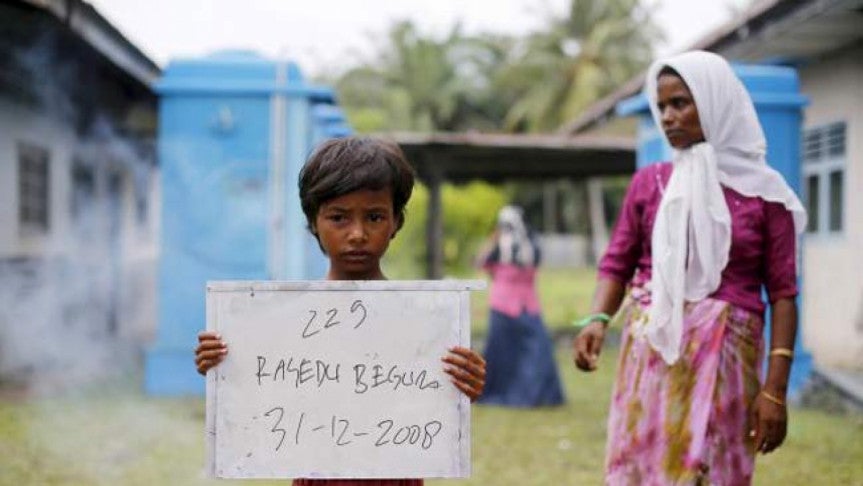US says need to save lives as Asia migrant crisis talks begin

Bangkok: The United States said on Friday that thousands of vulnerable migrants adrift in Southeast Asian seas needed urgent rescue, as Myanmar told a regional meeting on the crisis that it was not to blame.
More than 3,000 migrants from Bangladesh and Myanmar have landed in Indonesia and Malaysia since Thailand launched a crackdown on human trafficking gangs this month. About 2,600 are believed to be still adrift in boats, relief agencies have said.
‘We have to save lives urgently,’ US Assistant Secretary of State Anne Richard told reporters on her way into the meeting at a Bangkok hotel.
The gathering brings together 17 countries from across the Association of Southeast Asian Nations (ASEAN) and elsewhere in Asia, along with the United States, Switzerland and international bodies such as the UNHCR, the UN’s refugee agency.
‘More than ever, we need a concerted effort by all countries concerned,’ Thailand’s Foreign Minister General Tanasak Patimapragorn told the meeting, in an opening address. ‘It needs both Thai and international cooperation to solve the problem comprehensively.’
He summarised the gathering’s three objectives as being: first, to provide humanitarian assistance; then to combat the long-term problems of people smuggling; and finally to address the root causes of the problem.
Some participants have cautioned that the meeting was unlikely to produce a binding agreement or plan of action.
Many attendees are not ministerial-level and may not have the heft that organisers in Bangkok hoped for.
According to the Thai Foreign Ministry, at least three of the countries central to the crisis were not sending ministers: Myanmar, Indonesia and Malaysia.
Myanmar, the country of origin of many of the migrants, said it could not be held responsible for the crisis.
‘You cannot single out my country,’ Htein Lin, director general at Myanmar’s Ministry of Foreign Affairs and head of the country’s delegation said in his opening remarks. ‘In the influx of migration, Myanmar is not the only country.’
The region was suffering from a human trafficking problem, he said, and Myanmar would cooperate with regional and international efforts to find ‘practical mechanisms’ to deal with human trafficking.
People-smuggling camps
Officially called the Special Meeting on Irregular Migration in the Indian Ocean, the gathering takes place against the grim backdrop of Malaysia’s discovery of nearly 140 graves at 28 suspected people smuggling camps strung along its northern border. Thai authorities earlier found 36 bodies in abandoned camps on their side of the border, which led to the crackdown.
A Malaysian official, who did not want to be identified, told Reuters Malaysia had invited leaders of Indonesia, Thailand and Myanmar for an emergency summit on the crisis.
‘Malaysia is prepared to host,’ said the official. Asked when the summit was likely to be held, the official said: ‘It will take time to put together, and we don’t know yet.’
The crisis erupted at the beginning of the month, when the Thai crackdown on people-smuggling camps along its border with Malaysia made it too risky for traffickers to land migrants, prompting them to abandon thousands in crowded boats at sea.
Regional governments have struggled to respond, although images of desperate people crammed aboard overloaded boats with little food or water prompted Indonesia and Malaysia to soften their initial reluctance to allow the migrants to come ashore.
Malaysia, which says it has already taken 120,000 illegal immigrants from Myanmar, and Indonesia said last week they would give temporary shelter to those migrants already at sea, but that the international community must shoulder the burden of resettling them.
Thailand has refused to allow the boats to land, saying it is already sheltering 100,000 migrants from Myanmar, but has deployed a naval task force to offer medical aid at sea.
Thailand on Friday said it had given the United States permission to fly surveillance flights over Thai airspace to identify boats carrying migrants. US missions were already operating from bases in Malaysia, Richard said.
While some of the migrants are Bangladeshis escaping poverty at home, many are members of Myanmar’s 1.1 million Rohingya Muslim minority who live in apartheid-like conditions in the country’s Rakhine state.
The United States and the United Nations have said the deadly pattern of migration across the Bay of Bengal would continue unless Myanmar ends discrimination against the Rohingya.
Myanmar does not consider the Rohingya citizens, rendering them effectively stateless, while denying it discriminates against them or that they are fleeing persecution. It does not call them Rohingya but refers to them as Bengalis, indicating they are from Bangladesh.

 Reuters
Reuters




